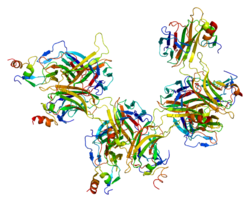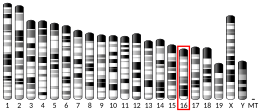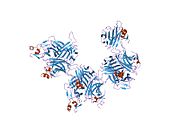B-cell maturation antigen
| TNFRSF17 | |||||||||||||||||||||||||||||||||||||||||||||||||||
|---|---|---|---|---|---|---|---|---|---|---|---|---|---|---|---|---|---|---|---|---|---|---|---|---|---|---|---|---|---|---|---|---|---|---|---|---|---|---|---|---|---|---|---|---|---|---|---|---|---|---|---|
 | |||||||||||||||||||||||||||||||||||||||||||||||||||
| |||||||||||||||||||||||||||||||||||||||||||||||||||
| Identifiers | |||||||||||||||||||||||||||||||||||||||||||||||||||
| Aliases | TNFRSF17, BCM, BCMA, CD269, TNFRSF13A, tumor necrosis factor receptor superfamily member 17, TNF receptor superfamily member 17 | ||||||||||||||||||||||||||||||||||||||||||||||||||
| External IDs | OMIM: 109545 MGI: 1343050 HomoloGene: 920 GeneCards: TNFRSF17 | ||||||||||||||||||||||||||||||||||||||||||||||||||
| |||||||||||||||||||||||||||||||||||||||||||||||||||
| |||||||||||||||||||||||||||||||||||||||||||||||||||
| |||||||||||||||||||||||||||||||||||||||||||||||||||
| |||||||||||||||||||||||||||||||||||||||||||||||||||
| |||||||||||||||||||||||||||||||||||||||||||||||||||
| Wikidata | |||||||||||||||||||||||||||||||||||||||||||||||||||
| |||||||||||||||||||||||||||||||||||||||||||||||||||
| BCMA TALL-1 binding domain | |||||||||
|---|---|---|---|---|---|---|---|---|---|
 crystal structure of stall-1 and bcma | |||||||||
| Identifiers | |||||||||
| Symbol | BCMA-Tall_bind | ||||||||
| Pfam | PF09257 | ||||||||
| InterPro | IPR015337 | ||||||||
| SCOP2 | 1oqd / SCOPe / SUPFAM | ||||||||
| |||||||||
B-cell maturation antigen (BCMA or BCM), also known as tumor necrosis factor receptor superfamily member 17 (TNFRSF17), is a protein that in humans is encoded by the TNFRSF17 gene.
TNFRSF17 is a cell surface receptor of the TNF receptor superfamily which recognizes B-cell activating factor (BAFF).[5][6][7]
Serum B-cell maturation antigen (sBCMA) is the cleaved form of BCMA, found at low levels in the serum of normal patients and generally elevated in patients with multiple myeloma (MM).[8]
Function[edit]
The protein encoded by this gene is a member of the TNF-receptor superfamily. This receptor is preferentially expressed in mature B lymphocytes, and may be important for B cell development and autoimmune response. This receptor has been shown to specifically bind to the tumor necrosis factor (ligand) superfamily, member 13b (TNFSF13B/TALL-1/BAFF), and to lead to NF-kappaB and MAPK8/JNK activation. This receptor also binds to various TRAF family members, and thus may transduce signals for cell survival and proliferation.[7]
Interactions[edit]
TNFRSF17 has been shown to interact with the B-cell activating factor TNFSF13B.[9][10] A conserved domain at the N-terminus, BCMA TALL-1 binding domain, is required for binding to the TNFSF13B.[9]
Clinical significance[edit]
TNFRSF17 is implicated in leukemia, lymphomas, and multiple myeloma[11] (see the "Mitelman Database" [12] and the Atlas of Genetics and Cytogenetics in Oncology and Haematology,[13]).
As a drug target[edit]
An antibody-drug conjugate Belantamab mafodotin (GSK2857916) has evaluated in patients with relapsed/refractory multiple myeloma.[14] Belantamab mafodotin was approved in the United States in August 2020 for the treatment of patients with relapsed or refractory multiple myeloma who have received at least four prior therapies.[15]
Chimeric antigen receptor (CAR) T cells have emerged as an important therapy for multiple myeloma after first reports in preclinical and phase I clinical studies.[16] [17] A Phase 1b/2 study of JNJ-4528, a CAR-T cell therapy directed against BCMA in myeloma patients refractory to a proteasome inhibitor or immunomodulatory drug, and who had received an anti-CD38 antibody has been completed.[18]
ALLO-715 is a CAR-T therapy by Allogene Therapeutics that targets B-cell maturation antigen (BCMA).[19] As of June 2021[update], it is undergoing clinical trials for the treatment of multiple myeloma.[20] On 21 April 2021, the FDA granted Regenerative Medicine Advanced Therapy status to ALLO-715.[21] ALLO-715 is being investigated at Memorial Sloan Kettering Cancer Center and the Mayo Clinic[22] as part of the UNIVERSAL trial for multiple myeloma, on its own and in conjunction with the selective gamma secretase inhibitor nirogacestat.[20][23]
References[edit]
- ^ a b c GRCh38: Ensembl release 89: ENSG00000048462 - Ensembl, May 2017
- ^ a b c GRCm38: Ensembl release 89: ENSMUSG00000022496 - Ensembl, May 2017
- ^ "Human PubMed Reference:". National Center for Biotechnology Information, U.S. National Library of Medicine.
- ^ "Mouse PubMed Reference:". National Center for Biotechnology Information, U.S. National Library of Medicine.
- ^ Laâbi Y, Gras MP, Carbonnel F, Brouet JC, Berger R, Larsen CJ, Tsapis A (November 1992). "A new gene, BCM, on chromosome 16 is fused to the interleukin 2 gene by a t(4;16)(q26;p13) translocation in a malignant T cell lymphoma". The EMBO Journal. 11 (11): 3897–3904. doi:10.1002/j.1460-2075.1992.tb05482.x. PMC 556899. PMID 1396583.
- ^ Laabi Y, Gras MP, Brouet JC, Berger R, Larsen CJ, Tsapis A (April 1994). "The BCMA gene, preferentially expressed during B lymphoid maturation, is bidirectionally transcribed". Nucleic Acids Research. 22 (7): 1147–1154. doi:10.1093/nar/22.7.1147. PMC 523635. PMID 8165126.
- ^ a b "Entrez Gene: TNFRSF17 tumor necrosis factor receptor superfamily, member 17".
- ^ Maglione PJ, Ko HM, Tokuyama M, Gyimesi G, Soof C, Li M, et al. (January 2020). "Serum B-Cell Maturation Antigen (BCMA) Levels Differentiate Primary Antibody Deficiencies". The Journal of Allergy and Clinical Immunology. In Practice. 8 (1): 283–291.e1. doi:10.1016/j.jaip.2019.08.012. PMC 6980522. PMID 31430592.
- ^ a b Liu Y, Hong X, Kappler J, Jiang L, Zhang R, Xu L, et al. (May 2003). "Ligand-receptor binding revealed by the TNF family member TALL-1". Nature. 423 (6935): 49–56. Bibcode:2003Natur.423...49L. doi:10.1038/nature01543. PMID 12721620. S2CID 4373708.
- ^ Shu HB, Johnson H (August 2000). "B cell maturation protein is a receptor for the tumor necrosis factor family member TALL-1". Proceedings of the National Academy of Sciences of the United States of America. 97 (16): 9156–9161. Bibcode:2000PNAS...97.9156S. doi:10.1073/pnas.160213497. PMC 16838. PMID 10908663.
- ^ "TNFRSF17 (tumor necrosis factor receptor superfamily, member 17)". atlasgeneticsoncology.org.
- ^ "Mitelman Database of Chromosome Aberrations and Gene Fusions in Cancer". Archived from the original on 2016-05-25. Retrieved 2015-01-29.
- ^ "Atlas of Genetics and Cytogenetics in Oncology and Haematology". atlasgeneticsoncology.org.
- ^ Lonial S, Lee HC, Badros A, Trudel S, Nooka AK, Chari A, et al. (February 2020). "Belantamab mafodotin for relapsed or refractory multiple myeloma (DREAMM-2): a two-arm, randomised, open-label, phase 2 study". The Lancet. Oncology. 21 (2): 207–221. doi:10.1016/s1470-2045(19)30788-0. PMID 31859245. S2CID 209425201.
- ^ Baines AC, Ershler R, Kanapuru B, Xu Q, Shen G, Li L, et al. (November 2022). "FDA Approval Summary: Belantamab Mafodotin for Patients with Relapsed or Refractory Multiple Myeloma". Clinical Cancer Research. 28 (21): 4629–4633. doi:10.1158/1078-0432.CCR-22-0618. PMC 9633344. PMID 35736811.
- ^ Carpenter RO, Evbuomwan MO, Pittaluga S, Rose JJ, Raffeld M, Yang S, et al. (April 2013). "B-cell maturation antigen is a promising target for adoptive T-cell therapy of multiple myeloma". Clinical Cancer Research. 19 (8): 2048–2060. doi:10.1158/1078-0432.CCR-12-2422. PMC 3630268. PMID 23344265.
- ^ Ali SA, Shi V, Maric I, Wang M, Stroncek DF, Rose JJ, et al. (September 2016). "T cells expressing an anti-B-cell maturation antigen chimeric antigen receptor cause remissions of multiple myeloma". Blood. 128 (13): 1688–1700. doi:10.1182/blood-2016-04-711903. PMC 5043125. PMID 27412889.
- ^ Madduri D, Usmani SZ, Jagannath S, Singh I, Zudaire E, Yeh TM, et al. (2019-11-13). "Results from CARTITUDE-1: A Phase 1b/2 Study of JNJ-4528, a CAR-T Cell Therapy Directed Against B-Cell Maturation Antigen (BCMA), in Patients with Relapsed and/or Refractory Multiple Myeloma (R/R MM)". Blood. 134 (Supplement_1): 577. doi:10.1182/blood-2019-121731. ISSN 0006-4971. S2CID 209265279.
- ^ Sommer C, Boldajipour B, Valton J, Galetto R, Bentley T, Sutton J, Ni Y, Leonard M, Van Blarcom T, Smith J, Chaparro-Riggers J (2018-11-29). "ALLO-715, an Allogeneic BCMA CAR T Therapy Possessing an Off-Switch for the Treatment of Multiple Myeloma". Blood. 132 (Supplement 1): 591. doi:10.1182/blood-2018-99-119227. ISSN 0006-4971.
- ^ a b Clinical trial number NCT04093596 for "Allogene Therapeutics" at ClinicalTrials.gov
- ^ "FDA Grants RMAT Designation to ALLO-715 for Relapsed/Refractory Multiple Myeloma". OncLive. 21 April 2021. Retrieved 2022-05-10.
- ^ "Safety and Efficacy of ALLO-715 and ALLO-647 BCMA Allogenic CAR T Cells in Adults With Relapsed or Refractory Multiple Myeloma (UNIVERSAL)". Mayo Clinic. Retrieved 2022-05-10.
- ^ Taylor NP (2020-12-07). "ASH: Allogene's off-the-shelf CAR-T posts 60% response rate in fiercely competitive BCMA field". Fierce Biotech. Retrieved 2022-05-10.
External links[edit]
- Human TNFRSF17 genome location and TNFRSF17 gene details page in the UCSC Genome Browser.
Further reading[edit]
- Treml LS, Crowley JE, Cancro MP (October 2006). "BLyS receptor signatures resolve homeostatically independent compartments among naïve and antigen-experienced B cells". Seminars in Immunology. 18 (5): 297–304. doi:10.1016/j.smim.2006.07.001. PMID 16919470.
- Mackay F, Leung H (October 2006). "The role of the BAFF/APRIL system on T cell function". Seminars in Immunology. 18 (5): 284–289. doi:10.1016/j.smim.2006.04.005. PMID 16931039.
- Gras MP, Laâbi Y, Linares-Cruz G, Blondel MO, Rigaut JP, Brouet JC, et al. (July 1995). "BCMAp: an integral membrane protein in the Golgi apparatus of human mature B lymphocytes". International Immunology. 7 (7): 1093–1106. doi:10.1093/intimm/7.7.1093. PMID 8527407.
- Loftus BJ, Kim UJ, Sneddon VP, Kalush F, Brandon R, Fuhrmann J, et al. (September 1999). "Genome duplications and other features in 12 Mb of DNA sequence from human chromosome 16p and 16q". Genomics. 60 (3): 295–308. doi:10.1006/geno.1999.5927. PMID 10493829.
- Gross JA, Johnston J, Mudri S, Enselman R, Dillon SR, Madden K, et al. (April 2000). "TACI and BCMA are receptors for a TNF homologue implicated in B-cell autoimmune disease". Nature. 404 (6781): 995–999. Bibcode:2000Natur.404..995G. doi:10.1038/35010115. PMID 10801128. S2CID 4323357.
- Hatzoglou A, Roussel J, Bourgeade MF, Rogier E, Madry C, Inoue J, et al. (August 2000). "TNF receptor family member BCMA (B cell maturation) associates with TNF receptor-associated factor (TRAF) 1, TRAF2, and TRAF3 and activates NF-kappa B, elk-1, c-Jun N-terminal kinase, and p38 mitogen-activated protein kinase". Journal of Immunology. 165 (3): 1322–1330. doi:10.4049/jimmunol.165.3.1322. PMID 10903733.
- Shu HB, Johnson H (August 2000). "B cell maturation protein is a receptor for the tumor necrosis factor family member TALL-1". Proceedings of the National Academy of Sciences of the United States of America. 97 (16): 9156–9161. Bibcode:2000PNAS...97.9156S. doi:10.1073/pnas.160213497. PMC 16838. PMID 10908663.
- Yu G, Boone T, Delaney J, Hawkins N, Kelley M, Ramakrishnan M, et al. (September 2000). "APRIL and TALL-I and receptors BCMA and TACI: system for regulating humoral immunity". Nature Immunology. 1 (3): 252–256. doi:10.1038/79802. PMID 10973284. S2CID 6799584.
- Kawasaki A, Tsuchiya N, Fukazawa T, Hashimoto H, Tokunaga K (August 2001). "Presence of four major haplotypes in human BCMA gene: lack of association with systemic lupus erythematosus and rheumatoid arthritis". Genes and Immunity. 2 (5): 276–279. doi:10.1038/sj.gene.6363770. PMID 11528522. S2CID 12315457.
- Novak AJ, Darce JR, Arendt BK, Harder B, Henderson K, Kindsvogel W, et al. (January 2004). "Expression of BCMA, TACI, and BAFF-R in multiple myeloma: a mechanism for growth and survival". Blood. 103 (2): 689–694. doi:10.1182/blood-2003-06-2043. PMID 14512299.
- Hymowitz SG, Patel DR, Wallweber HJ, Runyon S, Yan M, Yin J, et al. (February 2005). "Structures of APRIL-receptor complexes: like BCMA, TACI employs only a single cysteine-rich domain for high affinity ligand binding". The Journal of Biological Chemistry. 280 (8): 7218–7227. doi:10.1074/jbc.M411714200. PMID 15542592.
- Bellucci R, Alyea EP, Chiaretti S, Wu CJ, Zorn E, Weller E, et al. (May 2005). "Graft-versus-tumor response in patients with multiple myeloma is associated with antibody response to BCMA, a plasma-cell membrane receptor". Blood. 105 (10): 3945–3950. doi:10.1182/blood-2004-11-4463. PMC 1895080. PMID 15692072.
- Hendriks J, Planelles L, de Jong-Odding J, Hardenberg G, Pals ST, Hahne M, et al. (June 2005). "Heparan sulfate proteoglycan binding promotes APRIL-induced tumor cell proliferation". Cell Death and Differentiation. 12 (6): 637–648. doi:10.1038/sj.cdd.4401647. PMID 15846369.
- Chiu A, Xu W, He B, Dillon SR, Gross JA, Sievers E, et al. (January 2007). "Hodgkin lymphoma cells express TACI and BCMA receptors and generate survival and proliferation signals in response to BAFF and APRIL". Blood. 109 (2): 729–739. doi:10.1182/blood-2006-04-015958. PMC 1785096. PMID 16960154.
- Smirnova AS, Andrade-Oliveira V, Gerbase-DeLima M (February 2008). "Identification of new splice variants of the genes BAFF and BCMA". Molecular Immunology. 45 (4): 1179–1183. doi:10.1016/j.molimm.2007.07.028. PMID 17825416.
This article incorporates text from the United States National Library of Medicine, which is in the public domain.







